
Kőbánya-Kispest is the southern terminus of the M3 Line of the Budapest Metro. It is the only station of the line that is above ground.
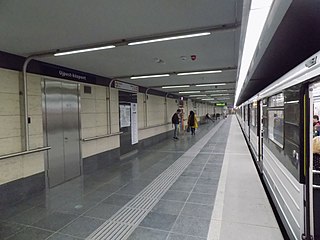
Újpest-központ is the northern terminus of the Budapest Metro Line 3. It is located beneath a busy intersection, the most important public transport hub in Újpest district.

Határ út is a station on the M3 (North-South) line of the Budapest Metro. Near the station, there are several tram and bus terminus, and a shopping centre. Határ út station named after the adjacent street Határ út, which literally means "(City) Border Street". Before the formation of Greater Budapest it was the border of Budapest Capital.
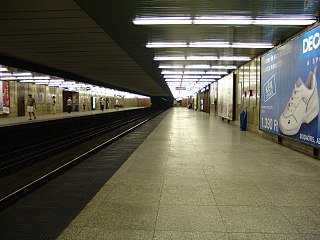
Ecseri út is a station on the M3 (North-South) line of the Budapest Metro. Next to the station there are the northern blocks of Attila József microraion. The station is named after the adjacent street Ecseri út.

Nagyvárad tér is a station on the M3 (blue) line of the Budapest Metro. The area around the station is home to several hospitals and the Semmelweis University medical school. The station is named after the adjacent square Nagyvárad tér, which named after the former Hungarian city of Nagyvárad.

Klinikák (Clinics) is a station on the M3 (north-south) line of the Budapest Metro. The area is scattered with various clinics of the Semmelweis University.

Corvin-negyed is a station on the M3 (North-South) line of the Budapest Metro. There is an exchange opportunity there for the 4-6 tram line. It is named after the quarter Corvin-negyed, a new commercial and residential complex, named after Matthias Corvinus, King of Hungary. The station formerly known as Ferenc körút after the adjacent street, which is part of the Grand Boulevard.

Lehel tér is a station on the Budapest Metro Line 3 (North-South). It is located beneath the eponymous square Lehel tér, named after the Hungarian chieftain Lehel.

Dózsa György út is a station on the Budapest Metro Line 3 (North-South). It is located beneath Váci Avenue at its intersection with the eponymous street Dózsa György út.
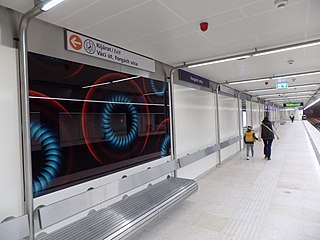
Forgách utca is a station on the Budapest Metro Line 3 (North-South). It is located in Angyalföld district, beneath Váci út between its intersections with streets Fáy utca and Forgách utca.

Gyöngyösi utca is a station on the Budapest Metro Line 3 (North-South). It is located under Váci út at its intersection with the streets Gyöngyösi utca and Meder utca.

Újpest-városkapu is a station on the Budapest Metro Line 3 (North-South).

Népliget is a station on the M3 (North-South) line of the Budapest Metro. The station lies under the intersection of Üllői Avenue and Könyves Kálmán Boulevard, and named after the city park Népliget. Népliget is also one of the most important suburban, inter-city and international bus terminal in Budapest, was rebuilt in 2003.
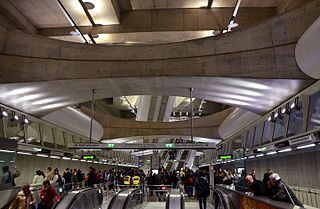
Kálvin tér is a transfer station on the M3 and the M4 lines of the Budapest Metro. It is located beneath the eponymous square, named after John Calvin.
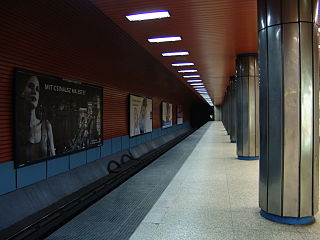
Ferenciek tere is a station on the M3 (North-South) line of the Budapest Metro located under the eponymous square in the Downtown. It is an important junction, as several bus lines from Buda pass through or terminate here. It is also the station closest to the geographical city centre of Budapest. The station's name was Felszabadulás tér before 1990.

Árpád híd is a station on the Budapest Metro Line 3 (North-South). It was the temporary terminus of Line 3 between 1984 and 1990.
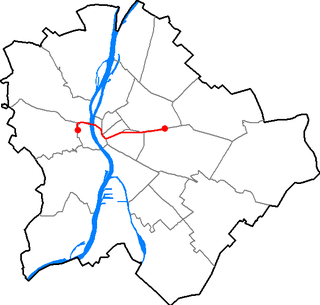
Line 2 is the second line of the Budapest Metro. The line runs east from Déli pályaudvar in north-central Buda under the Danube to the city center, from where it continues east following the route of Rákóczi út to its terminus at Örs vezér tere.
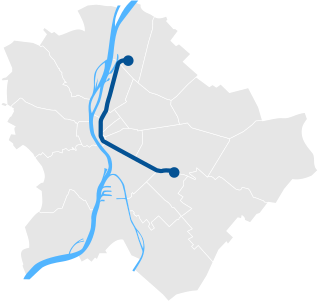
Line 3 is the third and longest line of the Budapest Metro. It runs in a general north-south direction parallel to the Danube on the Pest side, roughly following Váci út south from Újpest to the city center, then following the route of Üllői út southeast to Kőbánya-Kispest. Its daily ridership is estimated at 626,179. Like Line 1, it does not serve Buda.

Line 4 is the fourth line of the Budapest Metro. It opened on 28 March 2014.























